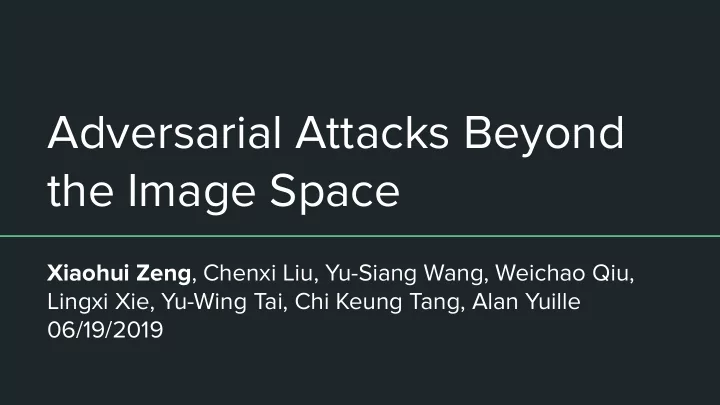

Adversarial Attacks Beyond the Image Space Xiaohui Zeng , Chenxi Liu, Yu-Siang Wang, Weichao Qiu, Lingxi Xie, Yu-Wing Tai, Chi Keung Tang, Alan Yuille 06/19/2019
Visual Recognition Pipeline
Visual Recognition Pipeline 3D scene
Visual Recognition Pipeline projection 3D scene 2D image
Visual Recognition Pipeline car projection recognition 3D scene 2D image label
Adversarial Attacks on 2D Image car projection recognition + bus recognition
Adversarial Attacks ● Can the network fail if we slightly modify 2D pixel values? ○ Yes!
Adversarial Attacks ● Can the network fail if we slightly modify 2D pixel values? ○ Yes! ● Should we be concerned about them in the real world? Well, sort of. ○
Adversarial Attacks ● Can the network fail if we slightly modify 2D pixel values? ○ Yes! ● Should we be concerned about them in the real world? Well, sort of. ○ ○ Potentially dangerous. ○ But require position-wise albedo change, which is unrealistic to implement.
Adversarial Attacks on 3D Scene car projection recognition + ??? rotation, projection recognition translation
Adversarial Attacks on 3D Scene car projection recognition + ??? lighting projection recognition
Adversarial Attacks ● Can the network fail if we ● Can the network fail if we slightly modify 2D pixel values? slightly modify 3D physical ○ Yes! parameters? ● Should we be concerned about ○ Well, let’s find out :) them in the real world? Well, sort of. ○ ○ Potentially dangerous. ○ But require position-wise albedo change, which is unrealistic to implement.
Adversarial Attacks ● Can the network fail if we ● Can the network fail if we slightly modify 2D pixel values? slightly modify 3D physical ○ Yes! parameters? ● Should we be concerned about ○ Well, let’s find out :) them in the real world? ● Should we be concerned about Well, sort of. them in the real world? ○ ○ Potentially dangerous. ○ If they exist, then we should ○ But require position-wise be much more concerned albedo change, which is than before, as they are unrealistic to implement. much more easily realized.
Visual Recognition Pipeline car projection recognition 3D scene 2D image label Physical Image Output Space Space Space
Visual Recognition Pipeline car rendering recognition 3D scene 2D image label Physical Image Output Space Space Space
Visual Recognition Pipeline car rendering CNN 3D scene 2D image label Physical Image Output Space Space Space
Visual Recognition Pipeline car rendering CNN 3D scene 2D image label Physical Image Output Space Space Space
Settings & Tasks Differentiable ● White box attack Renderer Use gradient descent ●
Settings & Tasks Differentiable ● White box attack Renderer Use gradient descent ● Non-Differentiable Black box attack ● Renderer ● Use finite difference for the non-differentiable component Chen, Pin-Yu, et al. "Zoo: Zeroth order optimization based black-box attacks to deep neural networks without training substitute models." Proceedings of the 10th ACM Workshop on Artificial Intelligence and Security. ACM, 2017.
Settings & Tasks Differentiable Renderer Non-Differentiable Renderer
Settings & Tasks Object Classification (ShapeNet) Differentiable Renderer Non-Differentiable Renderer Chang, Angel X., et al. "Shapenet: An information-rich 3d model repository." arXiv preprint arXiv:1512.03012 (2015).
Settings & Tasks Object Classification Visual Question (ShapeNet) Answering (CLEVR) Differentiable Renderer Non-Differentiable Renderer Johnson, Justin, et al. "Clevr: A diagnostic dataset for compositional language and elementary visual reasoning." In CVPR. 2017.
Settings & Tasks Object Classification Visual Question (ShapeNet) Answering (CLEVR) Differentiable Renderer #1 #2 Non-Differentiable Renderer #3 #4
#1: Differentiable + Object Classification ● Differentiable renderer: Liu et al, 2017 surface normal ○ ○ illumination material ○ Liu, Guilin, et al. "Material editing using a physically based rendering network." In ICCV. 2017.
#1: Differentiable + Object Classification ● Differentiable renderer: Liu et al, 2017 surface normal ○ ○ illumination material ○ ● Can image space adversarial noise be explained by physical space? ○ No for 97% of the case
#1: Differentiable + Object Classification ● Differentiable renderer: Liu et al, 2017 surface normal ○ ○ illumination material ○ ● Can image space adversarial noise be explained by physical space? ○ No for 97% of the case ● Attacking image space vs physical space: Image Surface N. Illumination Material Combined Attack 100.00 89.27 29.61 18.88 94.42 success %
#2: Differentiable + VQA ● Attacking image space vs physical space: Image Surface N. Illumination Material Combined Attack 96.33 83.67 48.67 8.33 90.67 success %
#3: Non-Differentiable + Object Classification ● Non-Differentiable renderer: Blender color ○ ○ rotation translation ○ ○ lighting
#3: Non-Differentiable + Object Classification ● Non-Differentiable renderer: Blender color ○ ○ rotation translation ○ ○ lighting How often does physical space attack succeed? ● ○ ~10% of the time ○ But highly interpretable: Rotate (-2.9, 9.4, 2.5) x 10 -3 rad along x, y, z Move (2.0, 0.0, 0.2) x 10 -3 along x, y, z Change RGB color by (9.1, 5.4, -4.8) x 10 -2 Adjust light source by -0.3 Change the light angle by (9.5, 5.4, 0.6) x 10 -2 cap helmet
#4: Non-Differentiable + VQA ● How often does physical space attack succeed? ~20% of the time ○ ○ But highly interpretable: Q: How many other purple objects have the same shape as the purple matte object? Move light source by (0.0, 3.0, -1.0, -1.7) x 10 -2 Rotate object 2 by (-1.6, 4.1) x 10 -2 Move object 3 by (-3.1, 6.2) x 10 -2 Change RGB of object 9 by (-3.7, -1.1, -4.5) x 10 -2 …… A: 0 A: 1
Conclusion ● We study adversarial attacks beyond the image space on the physical space Such attacks (via rotation, translation, color, lighting etc) can still succeed ● ● They pose more serious threat Rotate (-2.9, 9.4, 2.5) x 10 -3 rad along x, y, z Move (2.0, 0.0, 0.2) x 10 -3 along x, y, z Change RGB color by (9.1, 5.4, -4.8) x 10 -2 Adjust light source by -0.3 Change the light angle by (9.5, 5.4, 0.6) x 10 -2 cap helmet
Thank you!
Recommend
More recommend